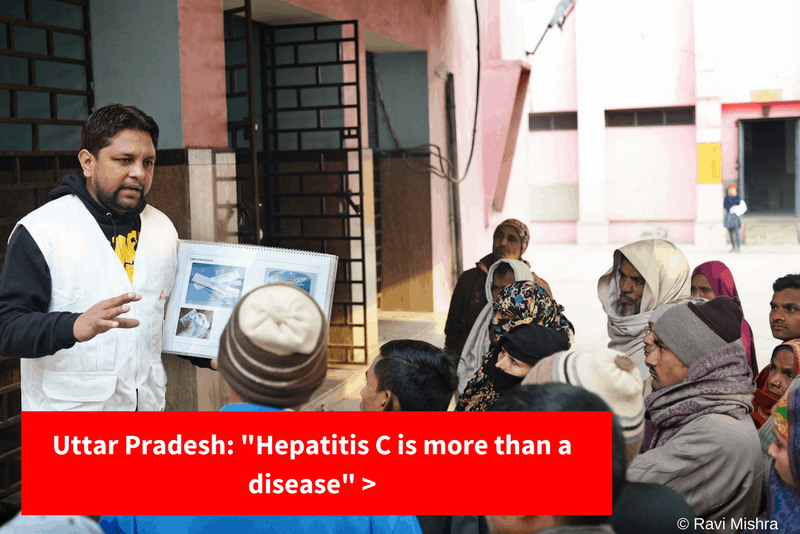In January 2017, Doctors Without Borders/Médecins Sans Frontiéres (MSF), in collaboration with the National Health Mission in Uttar Pradesh, started a pilot hepatitis project in Meerut city. Uttar Pradesh is one of the largest Indian states and has an estimated population of more than 200 million people.
The free clinic, located at the PL Sharma District Hospital, provides screening, counselling and health education as well as testing and treatment. MSF doctors at the clinic see more than 200 people per day for consultations, placing around 120 people on treatment every month. In the past year, the project has successfully cured 298 people of hepatitis C, placing 1,198 people on treatment.
While there have been no population-based prevalence surveys to estimate the level of the epidemic in the state, when the project launched MSF was soon overwhelmed with the sheer number of people coming for testing and treatment. The team was forced to set up a waiting list, which soon grew to more than 2,500 people.
“Initially, we were putting patients on treatment on a first come, first served basis, but due to the overwhelming number of patients we realized we had to prioritise treatment on the basis of the severity of the disease,” said Dr Stobdan Kalon, MSF Medical Coordinator. “Now, we prioritise patients with risk factors for faster deterioration of the disease.”
Many of the patients seeking care at MSF’s clinic are thought to have been infected through poor medical practices such as unsafe blood transfusions and by the use of unsterilized equipment by unqualified medical practitioners or traditional healers. Health promotion, therefore, plays a vital role in educating the community about prevention and access to testing and treatment.
“Through this collaborative pilot project, we aim to demonstrate that simplified models of care including testing and treating of hepatitis C are possible,” said Dr Hemant, MSF’s Project Medical Referent. “We hope that sharing our experiences with the state government will push for further scale-up of these services to provide access for a larger number of patients.”
To boost the number of people who successfully complete their treatment, MSF is using simplified, decentralized models of care that bring medical services closer to those who need them and mean patients only have to attend the clinic once a month to receive treatment.
MSF also uses the latest generation of hepatitis C drugs, called direct-acting antivirals (DAAs), which are available in India at a much lower cost compared to many other countries. They are still however priced out of the reach of millions of people in the country and around the world.
“This is a one of a kind medical project in the state and I am very happy that the PL Sharma District Hospital, along with MSF, is taking the lead in finding an effective model of care for treating those suffering from hepatitis C,” said Dr PK Bansal, Hospital Director, PL Sharma District Hospital. “In the last year, we have seen an overwhelming number of patients with hepatitis C knocking at the doors of this clinic. I believe there is a need to scale up this model of care, in Uttar Pradesh and across the country, in line with the WHO and Ministry of Health’s goal to eliminate the disease by 2030.”
The Indian government has started to take critical steps to provide access to hepatitis C diagnosis and treatment. A national action plan for hepatitis is currently being developed and is expected to be released soon. MSF is calling on the Indian government to adopt decentralization into its national action plan, to bring care closer to patients and increase success rates.
“As an organisation, MSF strongly believes that treatment should be accessible and affordable for everyone,” said Sophie Baylac, MSF’s Country Director. “While we ensure both by providing free care in this project, we believe that affordable access to diagnostics and treatment for all can only be delivered through the concerted efforts of national governments. We are therefore happy that the Indian government will soon launch a national programme for hepatitis. ”












